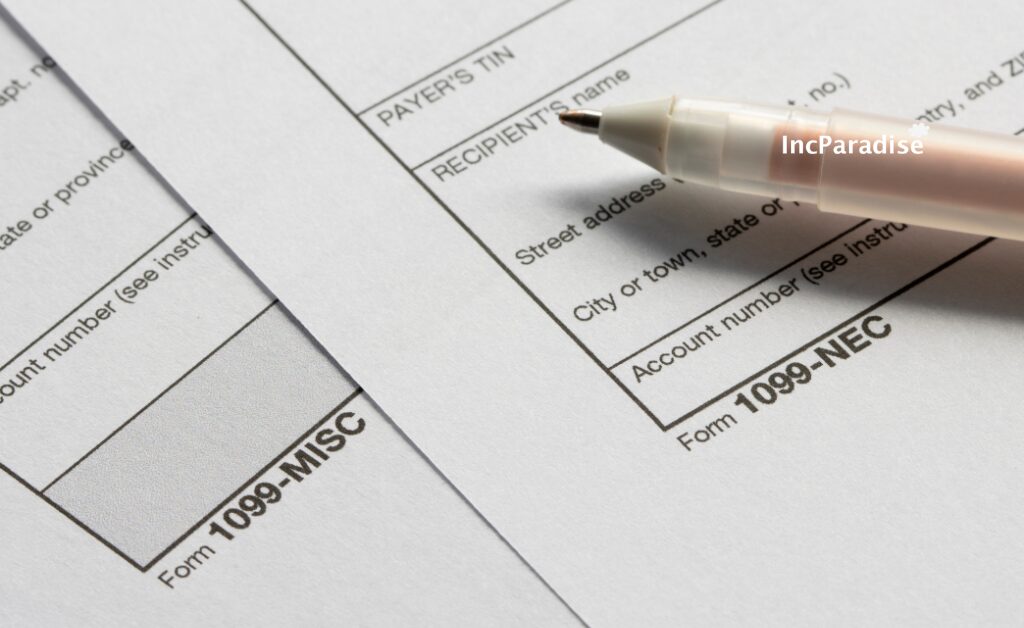If you run an LLC, Form 1099 is one of those things that tends to show up when you least expect it: usually around tax season, usually with a lot of unanswered questions. Do you need to issue one? Who should receive it? And does being an LLC change anything? The truth is, there isn’t a single yes-or-no answer. Whether your LLC needs to deal with the form depends on the kind of payments you make, who you pay, and how that person or business is taxed.
Add in multiple 1099 forms, different dollar thresholds, and a few easy-to-miss exceptions, and it’s obvious to see why so many business owners get stuck here. This guide walks you through Form 1099 from an LLC’s point of view. You’ll learn when you need to issue one, when you don’t, which form applies, and what actually matters, so you can handle it accurately and in line with the IRS requirements.

What is Form 1099?
The Form 1099 for an LLC is a federal income tax form. It is used to report money or benefits paid to an independent contractor, an estate, a partnership, a sole proprietor, or an attorney who is not employed by the LLC. Companies have to file this form with the IRS to report these payments. The payments can be for royalties, rents, or even just for their services. These forms are used as “information return” by the IRS. It should be noted that the payments made for personal reasons, or outside the course of regular business activity, should not be reported on a Form 1099 issued by an LLC. Form 1099 also includes multiple variations, each used to report different types of payments.
1099 Classifications
Although there are many parts to this form, the most common 1099 classifications include:
- 1099-DIV is used to report dividends
- 1099-MISC is used to report miscellaneous income, including rent, royalties, prizes, and awards.
- 1099-NEC is used to report nonemployee compensation
- 1099-S is used to report real estate transactions
- 1099-INT is used to report interest paid.
When required, an LLC must file Form 1099 at the end of each calendar year for each eligible payee it paid during the year as part of its business activities, such as an individual, partnership, or certain types of LLCs. Once completed, the LLC must provide a copy of the form to the payee and file a corresponding copy with the IRS. Both copies contain the same payment information.
When to issue Form 1099?
When required, a business must issue Form 1099 when it pays $600 or more during a calendar year for reportable payments. Different types of Form 1099 will have different issuing timelines. For example:
- Form 1099-NEC must be provided to the payee and filed with the IRS by January 31.
- For Form 1099-MISC, the payee copy is due by January 31 for most payments, but extends to February 17 when reporting Box 8 or Box 10 amounts.
- IRS filing deadlines for Form 1099-MISC are March 2 for paper filings and March 31 for electronic filings.
Common situations where reporting is required
As mentioned earlier, there are different situations where you may need to issue a Form 1099. The most common include:
- Rent: If you paid $600 or more in rent during the financial year, you must report the payment on Form 1099-MISC. This includes rent paid for equipment, machinery, or office space.
- Royalty payments: If you paid $10 or more in royalties to an LLC on intellectual property like patents, copyrights, or trademarks, you would have to report these payments.
- Nonemployee compensation: If you paid $600 or more to a nonemployee as compensation, you will have to report it. The nonemployee here is an independent contractor or a freelancer whom you hired for some specific and limited tasks.
- Products sold for resale: If you make direct sales of $5,000 or more in consumer products to a buyer for resale outside a permanent retail establishment, you must report this activity by checking the direct-sales box on Form 1099-MISC (Box 7) or Form 1099-NEC (Box 2). No dollar amount is entered; only the checkbox is marked. This requirement applies only to direct-sales arrangements and not to routine vendor or wholesale purchases.
Note
- The $600 threshold still applies to payments made in 2025 (forms filed in 2026).
- The $2,000 threshold applies to payments made starting in 2026 (forms filed in 2027).
Who gets a 1099 form?
The Form 1099 is used for those people who offer goods or services to your company. And the person who gets a 1099 cannot be an employee in the company. In short, these forms are issued to people who are considered to be independent contractors. Different types of workers are often referred to by the classification of their tax status, such as “1099 vendors” or “W-2 employees”.
Form 1099 for LLC
If your payee is an LLC that provides certain reportable services during the year, you may be required to file Form 1099. Here’s a quick breakdown of when the form applies and how to comply.
Does an LLC need a 1099?
Whether you must issue a Form 1099 for an LLC depends on how that LLC is taxed with the IRS. You can determine whether you should issue a 1099 for an LLC you paid by requesting a completed Form W-9 (Request for Taxpayer Identification Number and Certification) from the LLC. It tells you the LLC’s legal name, taxpayer identification number (TIN), and federal tax classification.
LLCs in general can be taxed in different ways for federal income tax purposes:
- Sole proprietor
- Partnership
- C corporation or S corporation.
These classifications are shown on the W-9 and determine whether 1099 reporting is required. You should provide the form:
- If the contractor files their taxes as a single-member LLC. This is because they are considered a “disregarded entity”.
- This rule also applies if your LLC elects partnership taxation (including most multi-member LLCs). The IRS taxes the LLC owners directly because the income passes through to them.
You are not required to provide the for if:
- If your LLC is taxed as a corporation (C corp or S corp). This means that all the business entities get Form 1099, unless they are a corporation.
- If your LLC is taxed as a corporation (C corp or S corp), then you do not have to issue the form 1099 for the contractor. So, all the business entities get a 1099 unless they are a corporation.
Missing or Incorrect W-9? File the 1099 Anyway
You saw us mention the form W-9 above, right? Well, all the LLCs have to submit the form W-9 to their customers and clients to facilitate the receipt of the 1099. If you were given services by an LLC, you should receive the W-9 form, which includes the legal name of the business, its address, tax ID number, how it is taxed, and its signature. But what if the company forgets to give you the W-9 form or selects the wrong option? In this case, it is better to just go ahead and file the 1099 forms for them.
1099 for Corporation
Under IRS information-reporting rules, payments made to a corporation are generally exempt from reporting requirements, though certain types of payments must still be reported.
- Medical and health care payments
- Substitute payments in lieu of dividends or tax-exempt interest
- Gross proceeds paid to an attorney
- Cash payments of $600 or more made to a person engaged in the trade or business of catching fish, when the fish are purchased for resale.
These exceptions appear in the IRS instructions for Form 1099, which list specific reportable payments that are not covered by the corporation exception.
Filing of Form 1099
Once you’ve determined that a Form 1099 is required, the next step is filing on time and understanding the consequences if not done right. Here’s what you need to know.
Possible penalties
If you do not file a required Form 1099 correctly and on time with the IRS, or you fail to provide a correct payee statement, the IRS can impose penalties per form based on how late the filing is.
As of 2026:
Simplify Compliance with Expert Support
Whether an LLC needs to issue a Form 1099 depends on two things: the type of payment and how the recipient is taxed. Once you understand these basics and collect Form W-9 from vendors consistently, meeting reporting requirements becomes simpler and more manageable.
That said, mistakes around 1099 reporting can cause avoidable IRS penalties, especially when dealing with contractors, multi-member LLCs, or corporate exceptions. Having the right guidance can help ensure your filings are accurate, timely, and compliant.
IncParadise supports business owners with:
- LLC and corporation formation in the U.S.
- EIN applications and compliance setup
- Registered agent services
- Ongoing business and tax-related guidance, including 1099 compliance considerations.
Whether you’re forming a new company or managing annual reporting obligations, having expert support can simplify compliance and let you focus on running your business. Get in touch with us to know more.
Last updated: February 2026








